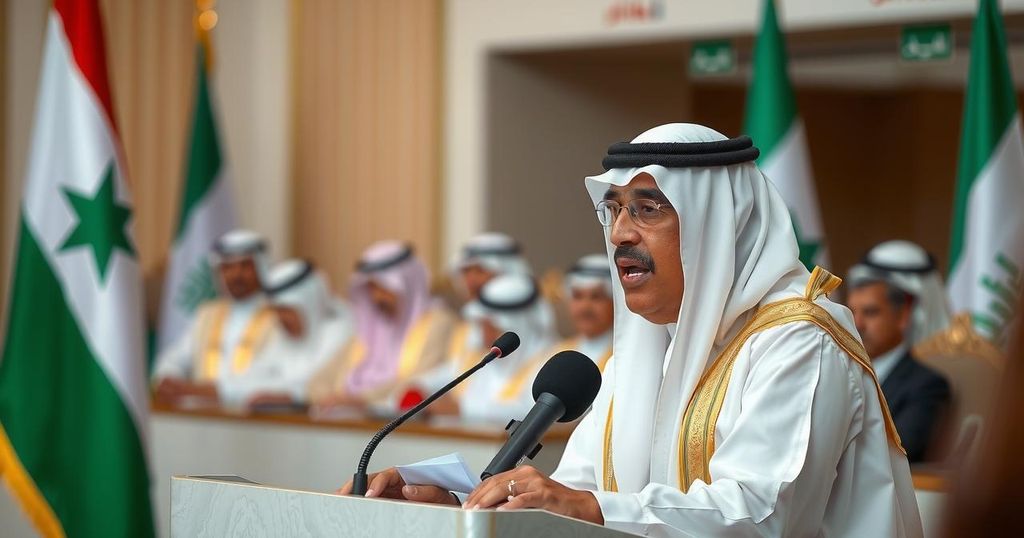Syria’s new leader, Ahmed Al-Sharaa, promised not to interfere negatively in Lebanon, emphasizing a new approach to Lebanese-Syrian relations during a landmark meeting with Walid Jumblatt. This marked the first visit from a Lebanese political figure to Syria since Bashar Assad’s regime fell. Both leaders discussed accountability for past crimes, reflecting aspirations for a stable, cooperative future amidst ongoing regional complexities.
In a historical meeting held in Damascus on Sunday, Syria’s new leader, Ahmed Al-Sharaa, pledged not to interfere negatively in Lebanon, marking a departure from past aggressive policies. This meeting, featuring a significant Lebanese delegation led by Druze leader Walid Jumblatt, symbolizes the first time a Lebanese political figure has visited Syria since the downfall of Bashar Assad’s administration. Al-Sharaa addressed the long-standing issues in Lebanese-Syrian relations, condemning past actions by the former Syrian regime that contributed to tensions between the two nations.
Al-Sharaa publicly acknowledged that Syria has been a source of concern for Lebanon, citing high-profile assassinations as a testament to the former regime’s detrimental influence. He emphasized that under his leadership, Syria would maintain an equidistant stance from all Lebanese factions, advocating for a future free of negative interference. Al-Sharaa also highlighted Syria’s commitment to supporting a stable and prosperous Lebanese economy, urging the populace to move beyond the historical grievances associated with Syria’s past involvement in Lebanon.
The discussions also encompassed the ongoing figures from the Assad regime still present in Lebanon, underlining the international community’s failure to resolve the Syrian crisis over the past 14 years. Jumblatt further articulated the need for accountability in both Lebanon and Syria, asserting that crimes against humanity must be addressed through fair trials. The backdrop of this evolving dynamic includes recent security incidents and the plight of detainees in Lebanese prisons, illustrating the complicated and intertwined histories of the two nations.
Moreover, on the same day, complications arose regarding the arrest of Syrian military figure Maj. Gen. Jamil Al-Hassan, with reports suggesting the movement of Syrian military personnel into Lebanon after Assad’s regime collapse. Jumblatt’s delegation also called for a comprehensive approach to improving Lebanese-Syrian relations, reflecting a fresh perspective amid a changing regional landscape.
The article discusses the evolving political dynamics between Lebanon and Syria following the collapse of Bashar Assad’s regime in Syria. It highlights the comments made by Syria’s new leader, Ahmed Al-Sharaa, regarding Syria’s commitment to non-interference in Lebanese affairs. The meeting occurred against the backdrop of a long history of tension between the two countries, particularly regarding military and political involvement and various assassinations attributed to the Syrian regime. The presence of former Syrian officials in Lebanon also adds complexity to the bilateral relations. Furthermore, ongoing security challenges, including drug trafficking and the situation of detainees in Lebanese prisons, reflect unresolved issues that persist due to the fraught historical context. Additionally, Jumblatt’s statements about accountability for crimes committed against both Lebanese and Syrians represent a call for justice and recognition of shared suffering, establishing a new chapter in the relationship between the two nations. Al-Sharaa’s declaration of a fresh approach contrasts significantly with the previous regime’s tactics, which were characterized by intervention and violence.
In summary, the meeting between Ahmed Al-Sharaa and Walid Jumblatt marks a significant shift in Lebanese-Syrian relations, with new commitments to respect Lebanon’s sovereignty. Al-Sharaa’s statements reflect a desire to foster stability in Lebanon without negative interference, which contrasts sharply with past Syrian policies. The dialogue around war crimes and the need for accountability continues to resonate in both nations, pointing toward a complex reconciliation process. Given the intertwined histories of both countries, the implications of these discussions will be significant in shaping future relations, stability, and justice in the region.
Original Source: www.arabnews.com






